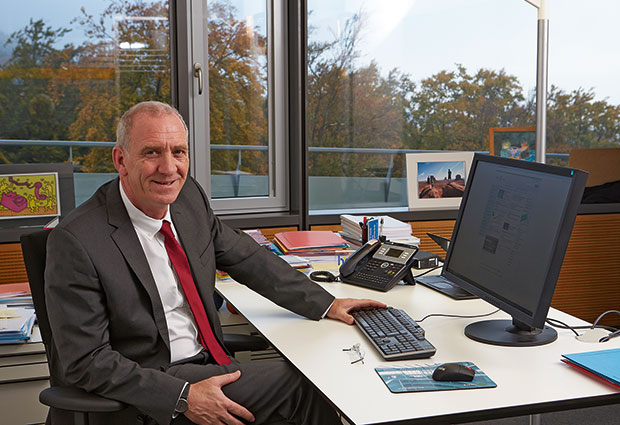
Walking the talk in HR
Rapidly approaching a year in post, Head of Human Resources Roland Block has bridged continents and reached for the stars in his three decades in the field. Composed and quietly passionate, he reveals how he’s emphasising the ‘human’ in human resources at EMBL.

Tell us about the structure of HR at EMBL …
Our team is close to 20 people, and that is a very reasonable ratio of around 1 per cent of EMBL’s overall staff. Over the past 10 months we have restructured HR into sections and, in a departure from the ‘generalist’ approach, are trying to achieve more specialism within the team. It is very difficult for new HR officers to quickly grasp all the nuances of EMBL’s employment conditions, categories and regulations. Instead, every team member now specialises in one or two areas, and can make a more meaningful contribution from the outset.
How do you support sites in four countries?
We had a very similar situation in my previous role at the European Southern Observatory (ESO): headquartered in Munich, with three observatories in Chile’s remote Atacama Desert – slightly more challenging distances than at EMBL! All sites, regardless of geography, need to be involved in HR strategy, policy and integration. We have HR team members based in Hinxton and aim to visit EMBL’s outstations regularly, remaining in close contact. We would like to increase our visibility and availability to engage in discussions and decision-making, keeping ourselves as well as others informed and involved.
What are the challenges of serving a multinational workforce?
By now, it is operationally straightforward for us to integrate international employees into the EMBL or local social security system; however, ensuring staff understand the benefits and performance of various social insurances in relation to that of their home country is as challenging as it is crucial. Employment conditions for temporary staff are especially demanding – we must understand the systems at all duty stations: how health insurance, pension and other long-term schemes operate, and what is best for EMBL staff.
What attracted you to work at EMBL?
This role promised new challenges: I was drawn to work with a qualified and dedicated team to further develop a modern and efficient Human Resources service, identifying EMBL’s special requirements and adjusting and adapting structures and processes accordingly. Alongside the Laboratory’s awe-inspiring science, from a HR perspective I found its fixed-term contract policy especially interesting. How is turnover managed? How does EMBL nevertheless retain knowledge and expertise? I had not encountered a tenure system of this measure before – I am now learning its consequences, and see the potential for more work in managing and documenting knowledge to prevent a loss of expertise, particularly in administration and support.
What do you enjoy most about working at EMBL?
You perceive it even at your interview: EMBL is something special! The camaraderie and openness of colleagues across the Laboratory is admirable. I am impressed by the supportive attitude of all sections of the EMBL community, my colleagues in HR and Administration, the managers and the Directorate. There is an acceptance and respect for HR and its contribution, and this is the basis to do good, even great work in Human Resources. I should also emphasise the very positive developments in relations and cooperation with the Staff Association.
What is your top recruiting tip for colleagues?
The selection panel should always take into consideration candidates’ behavioural and social competencies. We all work in teams and small groups, often in close proximity – colleagues need good ‘chemistry’ and personalities that mesh. Alongside academic and career expertise, employees need enthusiasm, flexibility and dedication. At EMBL, an open personality and willingness to communicate and collaborate is a must, regardless of your field.
How can HR shape an organisation and its culture?
Perhaps more so than others, HR needs to walk the talk: our values and actions must reflect those of EMBL. Through recruitment, HR can also help to address specific obstacles and opportunities – such as gender equality, especially in supervisory and senior positions. How these actions combined can mould the culture of the organisation depends on the people – this I cannot foresee.
What skills do you need to be successful in HR?
You have to take complete ownership of your work – to be responsible and decisive, and open about the process with the people concerned. This is particularly necessary in academic settings, where very astute colleagues deservedly want to understand why and how decisions are implemented. Our resource is ‘human’ after all: HR professionals should seek to solve staff problems as if they were their own.


